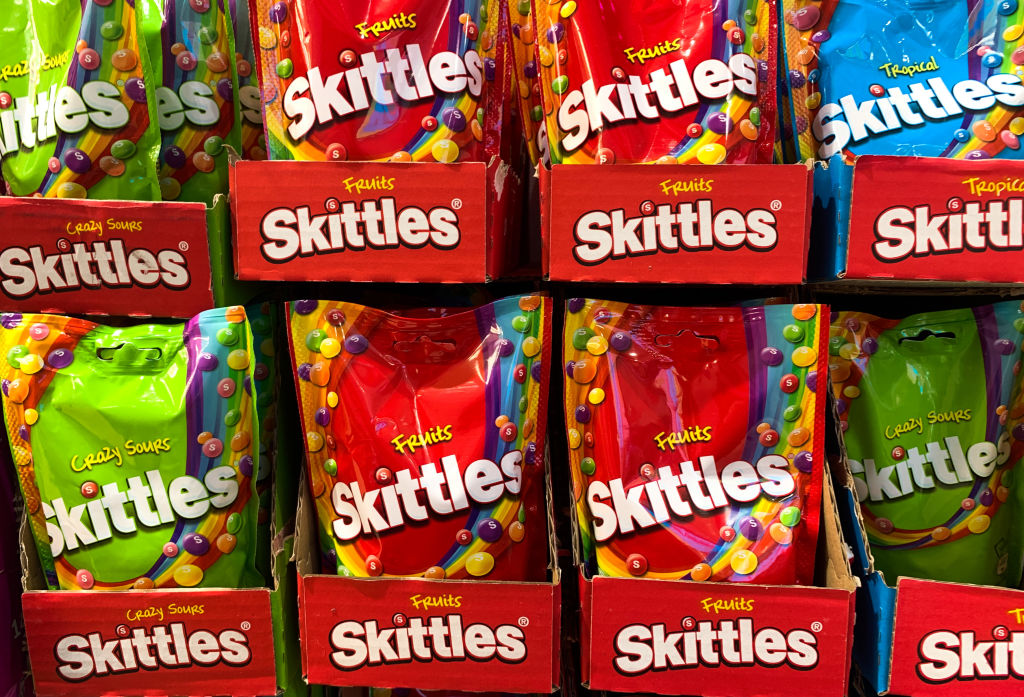
California legislators are considering a bill that could potentially ban the sale of Skittles and several other popular snacks because research shows some of the chemicals in them are toxic.
The bill would force companies to change the recipes of some beloved sweets, including M&Ms and Nerds candy, or to take drastic measures and pull their items from the California market. It’s unclear if the bill will gain momentum, but if passed, California would become the first state to ban specific additives in food.
The ban would apply to five chemicals—red dye No. 3, titanium dioxide, potassium bromate, brominated vegetable oil and propylparaben—which are generally used as preservatives, dyes and texture enhancers. The chemicals are approved for consumption in the U.S. by the Food and Drug Administration (FDA), but are all banned in Europe due to safety concerns.
Some of the bill’s supporters believe that federal regulations have overlooked scientific research linking the chemicals to ailments including cancer, neurological problems and behavioral issues in children.
Here’s what to know.
What are the intentions behind the bill?
The assembly member behind the bill, Jesse Gabriel, confesses that he loves candy, especially Skittles, and that he definitely wouldn’t support a bill to ban Skittles. That’s not the bill’s intention, he tells TIME. “This bill is about getting companies to change their recipes,” Gabriel says. “They still sell Skittles in Europe. They just removed titanium dioxide, which is a very dangerous ingredient.”
As a father of three young children, Gabriel worries about additives like these chemicals, citing risks for children’s development, reproductive issues and concerns over carcinogens and damage to the immune system.
“Part of the reason we chose [these five] is because for each of them, there is a readily available safer alternative,” Gabriel says.
Opposition against the bill has been strongest from trade associations, including the American Chemical Industry, the American Bakers Association and the California Chamber of Commerce. In a letter to the California Assembly’s health committee, 11 groups wrote, “this measure usurps the comprehensive food safety and approval system for these five additives and predetermines ongoing evaluations.”
What are the potential risks of these chemicals?
Much of the research around these chemicals showed potential health risks on animals, which scientists believe can apply to humans too. In 1990, the FDA banned the use of red dye No. 3 in cosmetics, but continues to permit it in thousands of food items. Potassium Bromate has been banned in the U.K., India, Brazil, Canada and across Europe, over fears that it could be carcinogenic. Although all of the chemicals proposed in the bill are FDA approved, some of them, like propylparaben and titanium dioxide, are restricted to make up 1% or less of the food item’s composition.
“A number of things on that list have been shown to potentially have harmful consequences,” Carolyn Slupsky, a nutrition professor at the University of California, Davis, tells TIME, adding that although we didn’t know about many of the risks when the chemicals first entered the market, more information is available now.
“The government has to be willing to help fund research into these chemicals that people want to put into the food supply, or that are already in the food supply, and start looking at it more carefully,” Slupsky says.
The FDA classifies many chemical additives as GRAS, or “Generally Recognized as Safe,” permitting their use. Gabriel criticizes the FDA’s review process, claiming that most of the chemicals were never independently reviewed or were last reviewed decades ago. The FDA’s process for reviewing food additives entails collecting data directly from manufacturers and rejecting or approving the additives for specific uses, but some researchers think the decades-old data on certain additives needs to be re-evaluated.
“These companies are going to have to put some of their money into finding alternate ways to preserve their product,” Slupsky says. “A lot of it is just for [food] color[ing].”
Recent research has also raised alarms that ultra processed foods increase the risk of various health issues, including obesity, high blood pressure, diabetes and dementia. “It’s not just that everybody sits on their butts and eats chips,” Slupsky says. “I think that we need to start looking more carefully at the types of food that we’re eating.”
Gabriel is hopeful that as companies begin to recognize the social responsibility they owe consumers, trade associations will also face pressure to push for new alternatives. “If this passes, it will certainly have an impact beyond California,” he says. “No one’s going to walk away from the California market; it’s too big.”
The bill will enter committee hearings next month, beginning April 11.
More Must-Reads From TIME
- The 100 Most Influential People of 2024
- The Revolution of Yulia Navalnaya
- 6 Compliments That Land Every Time
- What's the Deal With the Bitcoin Halving?
- If You're Dating Right Now , You're Brave: Column
- The AI That Could Heal a Divided Internet
- Fallout Is a Brilliant Model for the Future of Video Game Adaptations
- Want Weekly Recs on What to Watch, Read, and More? Sign Up for Worth Your Time
Contact us at letters@time.com